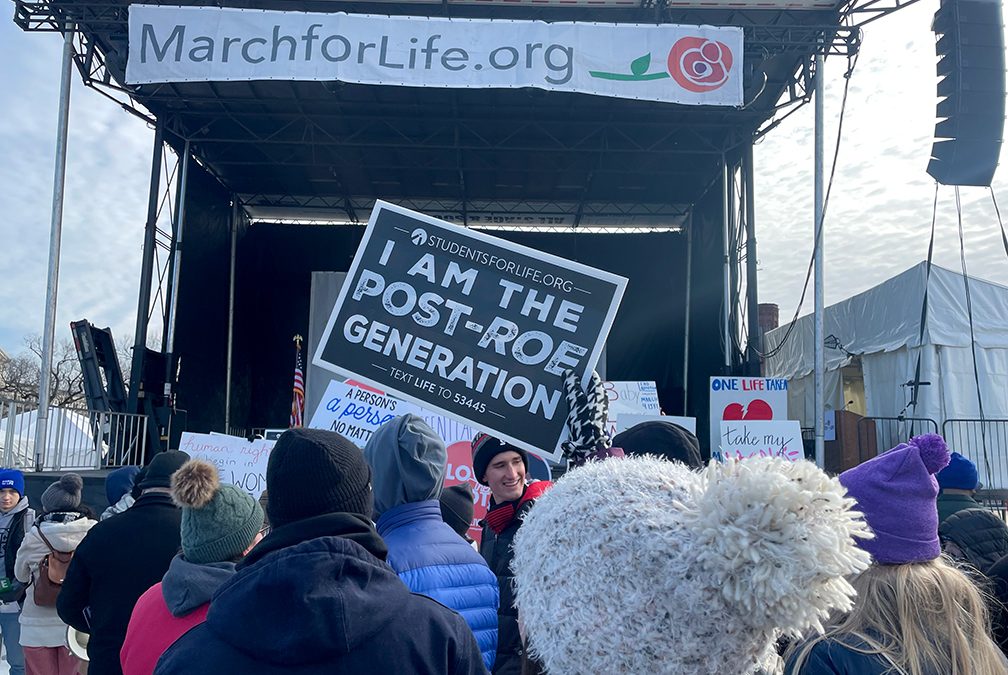WASHINGTON — Since 1974, anti-abortion activists have gathered each January in Washington, D.C., to protest the abortion rights granted under Roe v. Wade in January of 1973. With the Supreme Court set to issue a major ruling on abortion rights later this year that could overturn the ’73 ruling, attendees are hoping this will be the last annual anti-abortion march while Roe is the law of the land.
“This year we’ll be doing something new and distributing ‘I am the Post-Roe Generation’ signs,” Kristin Hawkins, president of Students for Life, told Sojourners in the days before the march.
For many of those marching through Washington to show their support for ending legal abortion in the United States, their presence was a demonstration of their religious faith; conservative Christians, including Catholics and evangelicals, have been associated with the anti-abortion movement for almost as long as Roe has been law.
“Faith is not the baseline for being pro-life … but as a Christian it does reiterate the importance of standing for life,” said Katie Rose Geer, a resident of Winston-Salem, N.C., who helped hand out signs before the march.
Yet, pro-choice Christians also say that their faith drives them support access to abortion.
When discussing why she supports abortion access with Sojourners, Rev. Katey Zeh, the CEO of the Religious Coalition for Reproductive Choice, said, “when I look at the model of Jesus and his ministry, I think what people need is a nonjudgmental, loving, compassionate presence to just simply hold space for them and tell them that they’re not alone as they go through [an abortion] because … the stigma and the shame is so isolating.”
Zeh noted her frustration with “a certain interpretation of particular Christian [that] ethics has been weaponized, and politicized by people who wish to maintain power.” She said it is important to separate the weaponization from the “core teachings” of Christianity, such as compassion, love of neighbor, and justice.
Before the end of the Supreme Court’s term in late June, the justices will rule on Dobbs v. Jackson, which considers a Mississippi state law that bans abortions after 15 weeks of gestation, which is unconstitutional under Roe v. Wade. The court could substantially alter or eliminate access to legal abortions in their decision.
Because of the conservative 6-3 majority on the Supreme Court, anti-abortion activists believe there is a strong chance of overturning the 49-year precedent set by Roe.
“We know that pretty soon, Roe v. Wade will be no longer, so we are on the cusp of a huge victory for the unborn,” said March for Life attendee Lucy Gonzales. “Now more than ever it’s just the most exciting time to be out here.”
Zeh, like other advocates for reproductive choice, hopes anti-abortion activists will consider the complexity and hardships that can come with pregnancy.
“It’s easy to romanticize pregnancy, it’s easy to romanticize parenthood … but pregnancy can be life threatening for lots of different reasons,” Zeh said. “The anti-abortion frame does not speak to those realities and complexities.”
On Thursday night before the march, Catholics for Choice protested an anti-abortion vigil held inside the Basilica of the National Shrine of the Immaculate Conception in Washington. First reported by Religion News Service, Catholics for Choice projected images on the basilica that offered support for pro-choice Catholics and projected a statistic that 1 in 4 abortion patients are Catholic.
According to a 2014 study from the Guttmacher Institute, a research organization that supports abortion rights, 24 percent of abortion patients are Catholic.
In a press release after the protest, Catholics for Choice president Jamie L. Manson said that abortion restrictions are the “antithesis of [her] Catholic social justice values” and that such bans “force folks to give birth against their will and disproportionately harm people who [are] already broken and crucified by the sinful structures of systemic racism, gender inequality, economic insecurity and immigration restrictions.”
Rev. Doug Robinson-Johnson of the National United Methodist Church in D.C. told Sojourners that “the tradition of Christianity is a tradition of humility,” and said faith guides him to remain humble and recognize the nuance in every decision, especially for complex issues like abortion.
“[The Bible is] a complicated text that we all have to work together on to understand,” Robinson-Johnson said. “Each person is on an individual journey, so those people that have discerned they can keep and those who have discerned they cannot keep a child are equally beloved.”
Zeh said that, regardless the outcome of Dobbs, people of faith are likely to have diverging opinions on abortion.
“I can’t think of a single thing that all people of faith agree on, so why would abortion be any different?” Zeh said.

